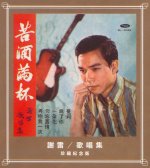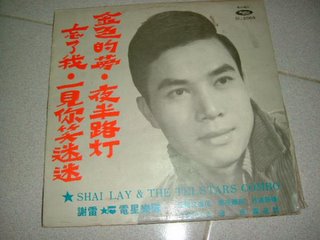Tuesday, February 28, 2006
Bungo Podcast
Japanese Classical Literature at Bedtime offers podcasts of Genji Monogatari, Oku no Hosomichi, and others.
Saturday, February 25, 2006
New Chinese Characters
Chinese-tools and Sinosplice have some pretty funny "new Chinese characters" created by foreigners--character-readers of both Hanzi and Kanji persuasions will be able to get the jokes.
These made me think of the artist Xu Bing, who writes English in character-form (take a look and you'll see what I mean).
These made me think of the artist Xu Bing, who writes English in character-form (take a look and you'll see what I mean).
Friday, February 17, 2006
$1 Million Bill
Did you read the story about the Japanese investors who were scammed out of millions by someone selling fake million dollar bills? I had to read this sentence a couple times before I got it:
The president [of a construction company] showed them a thousand of the $1 million notes featuring a portrait of George Washington at a Tokyo hotel, according to Asahi.George was apparently in town to shoot a Suntory whiskey commercial.
Sunday, February 12, 2006
Words Which Mean Their Own Opposites, Part 2
Another word that means its own opposite from AC Muller's CJKV-English Dictionary:
沽
To sell (an article, object). To buy. A wine seller. A huckster, hawker, peddler. Negligent, careless, remiss.
Though, I think if a word means "buy" and "sell," it might be better understood as meaning "trade" or "barter."
沽
Though, I think if a word means "buy" and "sell," it might be better understood as meaning "trade" or "barter."
Tuesday, February 07, 2006
Taiwanese Pop Gets Boing-Boinged
Boing Boing picked up a post about a 1960s Taiwanese pop band called the Telstar Combo today. The album cover looked great, so I was curious to find out ore about these guys. It ends up they were the backing band for a famous singer named Hsieh Lei 謝雷.
Hsieh Lei hit it big in 1967 with an old Taiwanese song from the 1930s called "Wine Cup of Sorrow 悲戀的酒杯 " which was given new Mandarin lyrics and re-titled "Full Cup of Bitter Wine 苦酒滿杯." The new version was banned under the KMT.

Hsieh had a record store near the Taipei Train Station in those days, and the record was selling so fast they had to restock during the day. Fans would surround the returning truck and buy the records up before they could even be put on the store's shelves.
The record was put out by Haishan Records, the dominant force on the pop scene back then. Their roster included around 80% of the big stars of the 60s and 70s, but they got hit badly by financial troubles in the early 80s. Many of the employees jumped ship and started their own record companies. Haishan is still around, but it only puts out re-issues of the oldies.
Here's a picture of an album by Hsieh Lei (Shai Lay) and the Telstars Combo called "Golden Dream."


Hsieh Lei hit it big in 1967 with an old Taiwanese song from the 1930s called "Wine Cup of Sorrow 悲戀的酒杯 " which was given new Mandarin lyrics and re-titled "Full Cup of Bitter Wine 苦酒滿杯." The new version was banned under the KMT.

Hsieh had a record store near the Taipei Train Station in those days, and the record was selling so fast they had to restock during the day. Fans would surround the returning truck and buy the records up before they could even be put on the store's shelves.
The record was put out by Haishan Records, the dominant force on the pop scene back then. Their roster included around 80% of the big stars of the 60s and 70s, but they got hit badly by financial troubles in the early 80s. Many of the employees jumped ship and started their own record companies. Haishan is still around, but it only puts out re-issues of the oldies.
Here's a picture of an album by Hsieh Lei (Shai Lay) and the Telstars Combo called "Golden Dream."


Subscribe to:
Posts (Atom)